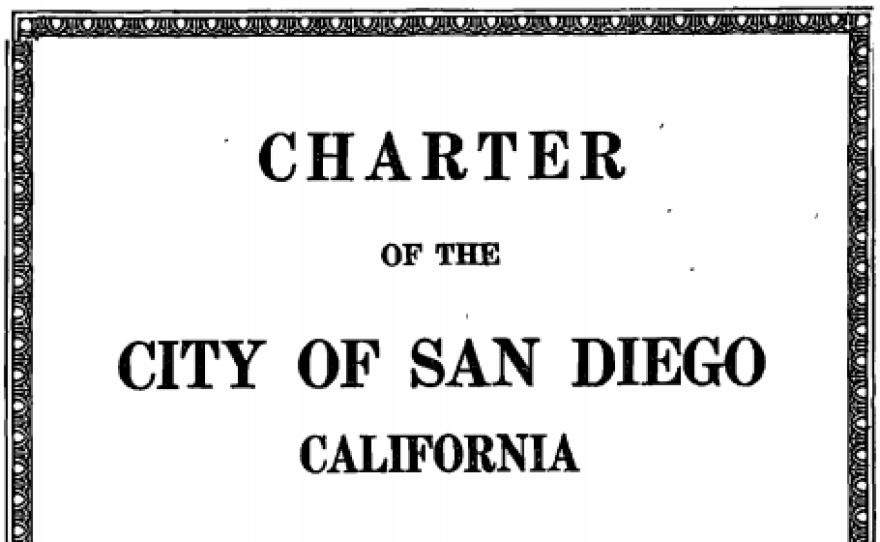San Diegans will see seven propositions, labeled A through G, on their June ballots.
They all have to do with cleaning up the City Charter, a document that acts as San Diego's constitution.
But unlike the U.S. Constitution, the city's 149-page charter includes some very specific instructions and laws, some of which are outdated, said City Council President Sherri Lightner, who also heads the city's Charter Review Committee.
The committee has spent more than a year reviewing the charter and came up with the proposed changes, all of which must be approved by voters. Lightner said they will have more changes on the November ballot as well.
San Diego's current city charter dates to 1931 and has been amended 245 times, according to the City Clerk's Office.
Lightner said most of the changes were additions, so "we wound up with a lot of excess baggage in the charter."
"We're very interested in cleaning it up, just making it more efficient," she said.
Lightner stressed that none of the changes are meant to be controversial or make major alterations to city laws.
"It's about housecleaning the charter," she said. "They will make the charter much easier for city staff and the public to understand so they know what the charter says."
The San Diego Regional Chamber of Commerce and the League of Women Voters of San Diego have endorsed the proposed changes, and no one submitted arguments against them in election materials.
Below are brief descriptions of each proposed change. Full descriptions, including the exact language changes, can be found here.
• Proposition A — Redistricting: City Council districts are drawn by a citizen redistricting commission every 10 years. This proposition would increase the commission from seven to nine members, allow for two alternate commissioners, expand the application period to be on the commission from 30 days to 60 days and increase the number of required public hearings before the redistricting plan is drawn.
• Proposition B — Issuing Bonds: This would take out 17 pages from the charter that include "very detailed instructions about water and sewer bonds that are no longer valid," Lightner said.
The old language would be replaced with two paragraphs that specify the City Council can issue revenue bonds with a two-thirds vote as long as the money doesn't come from the city's general fund and "the purpose of the bond issue is to provide for the construction, reconstruction or replacement of water facilities, wastewater facilities, or stormwater facilities."
It also says the City Council can issue general obligation bonds "in accordance with the California Constitution" and that both general obligation bonds and revenue bonds "may be issued and sold in accordance with state law and any other local procedure adopted by ordinance" — all-encompassing language Lightner said helps ensure city law won't conflict with state law.
• Proposition C — Property Taxes: This would remove some charter language that conflicts with California Proposition 13, which says government can't raise taxes without two-thirds voter approval. It doesn't impose any new taxes.
• Proposition D — Power to Fix Salaries: This removes old language that pre-dates San Diego's change to a strong mayor form of government and adds language to specify the city will follow the state laws for collective bargaining between the city and its employees.
It covers salaries for non-elected officials. Lightner said salary-setting rules for elected officials could be taken up on the November ballot.
• Proposition E — Budgeting: This outlines the city's budget process in one "easy to read place" in the charter, Lightner said, including the schedule for how the city budget is proposed, reviewed and adopted.
• Proposition F — Financial Operations: This would allow the city to pay claims using electronic funds transfers. It would also allow the city to approve contracts for bond-funded projects faster by clarifying the requirement that funds be certified before city contracts can be approved. It would also require the city to establish emergency reserves, and specifies that those reserves can only be accessed by a two-thirds vote of the City Council.
• Proposition G — Audits of Accounts of Officers: This removes the requirement that the city auditor do close-out audits and investigations of city officials who stop working for the city. It says the auditor is allowed, but not required, to perform close-out audits.
Lightner said she wasn't able to do one housecleaning item she was looking forward to: a substitution of gender-neutral language, for instance changing "firemen" to "firefighters." She said the City Attorney's Office decided that changing words throughout the entire charter would mean printing the entire charter in election materials, which would be too expensive.
The sections that are on the June ballot will have new gender-neutral terms, but not the entire charter.







